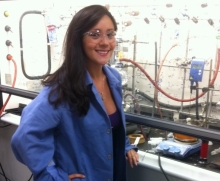
Major:
Mentor(s):
Faculty Sponsor(s):
Faculty Sponsor's Department(s):
Project Title:
Project Description:
Heterobifunctional polyethylene glycol was synthesized with specific functional groups for convenient attachment to nanoparticles and biologically active molecules. Functionalizing PEG and allowing it to bear different functional groups, enables the use of nanoparticles as drug delivery carriers, imaging agents for diagnostics, and specific targeting systems. Present studies suggest that PEG facilitates in the hydrophilicity of biomaterial substrates and subsequently aids in attaining a receptive immune system response. PEGylation of biomaterial substrates also decreases their immunogenicity and enzyme degradation. An important characteristic of PEGylation is the selection of the functional groups on PEG since these are used to attach the PEG to biologically active molecules, such as peptides or proteins. The present study is aimed at synthesizing PEG derivatives in the most efficient and effective manner, while still maintaining the stability of the attached functional groups. We chose to create a heterobifunctional PEG derivative carrying a thiol group on one end and an active ester on the other end. The synthesis of this PEG derivative was verified by 1H NMR and involved the evolution of synthetic methods to determine the appropriate synthetic steps to maximize yield and functional group compatibility. To create the most useful PEG derivatives we will design methods of preparation that provide a simple route for the synthesis of heterobifunctional PEGs. This study will provide useful information regarding PEGylation and its potential uses in nanomedicine.
